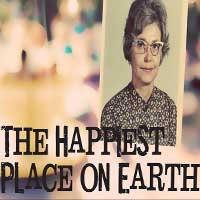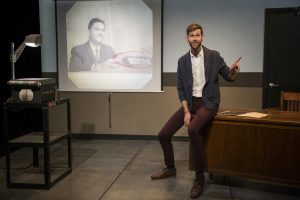
 Highly Recommended ****Easily the most accomplished of the solo performances I’ve seen during Greenhouse Theater Center’s festival of one-person shows, The Happiest Place On Earth, written and performed by Philip Dawkins, focuses on the author’s family history, tying it to the history of Disneyland, the titular ‘happy place.’ He explores the way his family’s history has been shaped by the dream and the promise of the Magic Kingdom, but ultimately he is unable to find any real understanding, preferring to remain on the deeply felt but logically shallow surface.
Highly Recommended ****Easily the most accomplished of the solo performances I’ve seen during Greenhouse Theater Center’s festival of one-person shows, The Happiest Place On Earth, written and performed by Philip Dawkins, focuses on the author’s family history, tying it to the history of Disneyland, the titular ‘happy place.’ He explores the way his family’s history has been shaped by the dream and the promise of the Magic Kingdom, but ultimately he is unable to find any real understanding, preferring to remain on the deeply felt but logically shallow surface.
In 1963, the author’s grandfather, a sports announcer at a local TV station in Albuquerque, suffers an aneurysm while live on camera, sending his wife and four daughters (one of them is the author’s mother) on a journey of grief. Completely baffled as to how to care for her daughters, a family friend suggests they visit Disneyland for Christmas, and a family tradition is born.
Taking on the persona of the women in his family, from his nana, Betty Lou, to his conspiracy-theory obsessed aunt Lynn, Mr. Dawkins commands the stage with a sweet and engaging presence. His skill as an actor allows him to move through the different characters and stories, holding the audience’s attention in the first half effortlessly. He’s like a gregarious friend at a cocktail party holding court, doing impressions of his mom and telling amusing family tales. But like those storytellers, as the night goes on, he begins to wear out his welcome with poorly conceived conclusions and explanations.
When he stays in the realm of anecdote, he soars. I love hearing about people’s family histories, the way certain details take on mythic proportions, the way each member is cast perennially in a certain light, no matter how they may try to change it. Take aunt Nan, for example. The youngest of the sisters, she complains in a painful monologue how she has been left behind by her family her whole life. And then there’s that time aunt Karen threw up on a cranky lady in the bathroom at Disneyland. Or when his mom as an 8-year-old interrogates a woman playing Cinderella on the meaning of loss and grief. These moments have the well-worn grooves of a story told many times and are still enjoyable after a thousand tellings.
But Dawkins’s attempts to superimpose the map of Disneyland on top of his family’s history, using a nostalgic overhead projector, fall flat. He recounts some interesting facts, giving a fun and critical look at the genesis of the Disney mythos, but he rarely connects the dots in a satisfying way. What ends up happening is more of an emotional catharsis than a logical conclusion. Masterful at tugging at heart strings, he demonstrates the emotional depth of his family’s trials and tribulations, but he also uses this emotionality to hide his rather shabby metaphors.
His central question–“Is happiness sustainable?”–comes after a problematic assessment of Disney’s place in American culture, sliding away from the substance of the issue as he approaches it. As he lists the ways that Disney has become more accepting of other cultures and minorities, he asks, “Could Disney do better?” followed immediately by “Could I do better?” It’s this identification with Disney that hints at why his conclusions fail to make sense: the author has gleaned too much of his life philosophy from Disney films and stories, and he assumes you have too. So when he asks this question about the sustainability of happiness, he finds himself troubled by the fact that these stories have led his family astray. Yet he is unable to be critical of this unrealistic Disney dream, unable to admit that happiness is not a static state, but something moving through us, departing and returning, forever.
********
The Happiest Place on Earth will be at the Greenhouse Theater Center until October 23
 playing on Wednesday-Saturday at 8:00pm
playing on Wednesday-Saturday at 8:00pm
Sundays at 2:30pm.
Tickets can be purchased from online at www.greenhousetheater.org or by calling the box office at 773-404-7336.
To see what others are saying, visit www.theatreinchicago.com, go to Review Round-Up and click at “The Happiest Place on Earth”.






More Stories
“The Firebugs” reviewed by Julia W. Rath
“The Book of Grace” Al Bresloff with another from Paul LIsnek
“The Last Five Years” MILWAUKEE